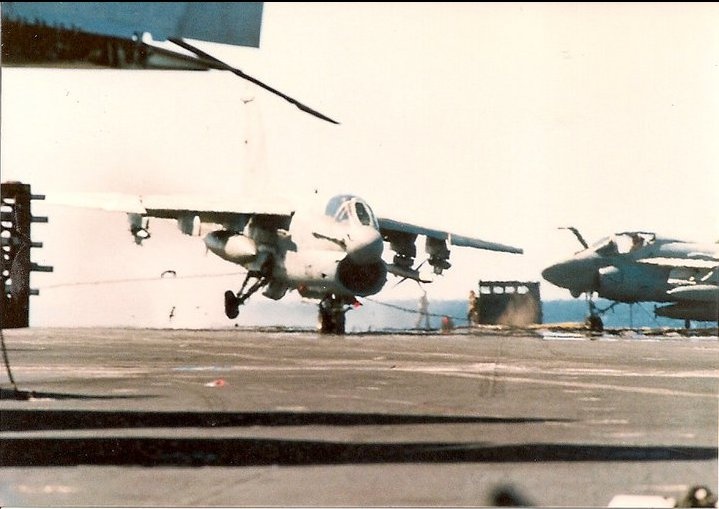‘Upon contact with the flight deck, the throttle is advanced to full power. Prior to that, the pilot modulates throttle to maintain the proper rate of descent, but upon touchdown, they advance the throttle to full,’ David Tussey, Former US Navy A-7E Corsair II pilot.
Landing aircraft on a flight deck of an aircraft carrier is made possible through the use of arresting cables installed on the flight deck and a tailhook installed on the aircraft.
The pilot aims for the middle arresting wire, which is either the second or third depending on the configuration of the carrier. Upon touchdown, the throttles are advanced to military/full power for three seconds. This is done to keep the engines spooled and provide thrust in case a bolter (missing every wire, go-around) occurs or even in the unlikely event of a cable snapping. Afterward, the throttles are reduced to idle, and the hook is raised on the aircraft director’s signal.
‘Upon contact with the flight deck, the throttle is advanced to full power. Prior to that, the pilot modulates throttle to maintain the proper rate of descent, but upon touchdown, they advance the throttle to full,’ says David Tussey, former US Navy A-7E Corsair II pilot, on Quora. ‘Once the pilot is certain that the aircraft has fully trapped aboard, then the throttle is reduced to idle.’
‘This is done to allow the aircraft to immediate regain flying speed should an arrested landing is not achieved. The most common reason for this is when the pilot is too high on glide slope, and the touchdown point on the carrier deck is forward of the arresting cables, resulting in what is known as a “bolter”. In which case, the aircraft needs to get back up flying as soon as possible.
‘Of course, there are times when the pilot intends to just execute a touch-and-go on the carrier deck, usually for carrier qualifications, so full throttle on touchdown is necessary.’
Tussey continues;
‘Another scenario is when the pilot flies a proper landing, but the tailhook on the aircraft bounces in such a way as to skip over the arresting cables. The tailhook design is supposed to prevent this, but sometimes it doesn’t. This is known as a “hook skip”, and again results in the aircraft needing to become airborne as soon as possible.
‘A very unlikely scenario, is for the cable to break upon arrestment, again resulting in the need for the aircraft to regain flying speed as soon as possible. This situation is, as you might expect, extremely rare and very dangerous.
‘The need for pilots to execute an immediate takeoff under these circumstances is what let the USN have an angled deck for landing…so that the aircraft can takeoff again without encountering any other aircraft parked on deck. Older WWII aircraft carriers did not have this design, and so there are some horrific crash videos of those days.’
Tussey concludes;
‘Even on good days, it’s a controlled crash.’

U.S. Navy photo by Photographer’s Mate Airman Charlie Whetstine and David Tussey

